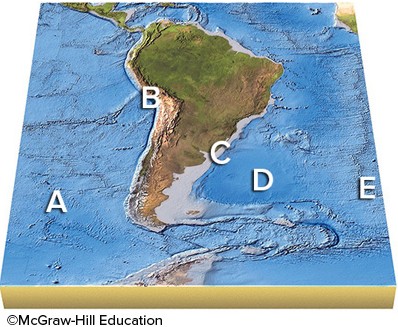Why do you typically find bigger rocks along the banks of a fast-moving stream and smaller rocks and pebbles beside a slower-moving stream?
A. Slow-moving streams carry only dissolved sediments.
B. As a stream slows, it deposits its smaller sediments first.
C. Fast-moving streams carry only large sediments.
D. As a stream slows, it deposits its larger sediments first.
Answer: D
You might also like to view...
Which of the following is not a property of a cinder cone?
A) usually less than 600 meters tall B) typically produced by one, prolonged eruption C) can be up to 10000 meters tall D) composed of basaltic to andesitic cinder
Weather and climate are synonymous terms
Indicate whether the statement is true or false
Where is subduction occurring on this map of South America?
A. A B. B C. C D. D E. E
Environmental policy aims to ________
A) use natural resources for economically important industrial products B) preserve all present natural areas in their pristine condition for future generations C) promote fairness among people and groups in the use of resources and protection from pollution D) protect the values of the landowner from unfair government regulations E) promote economic growth and social prosperity